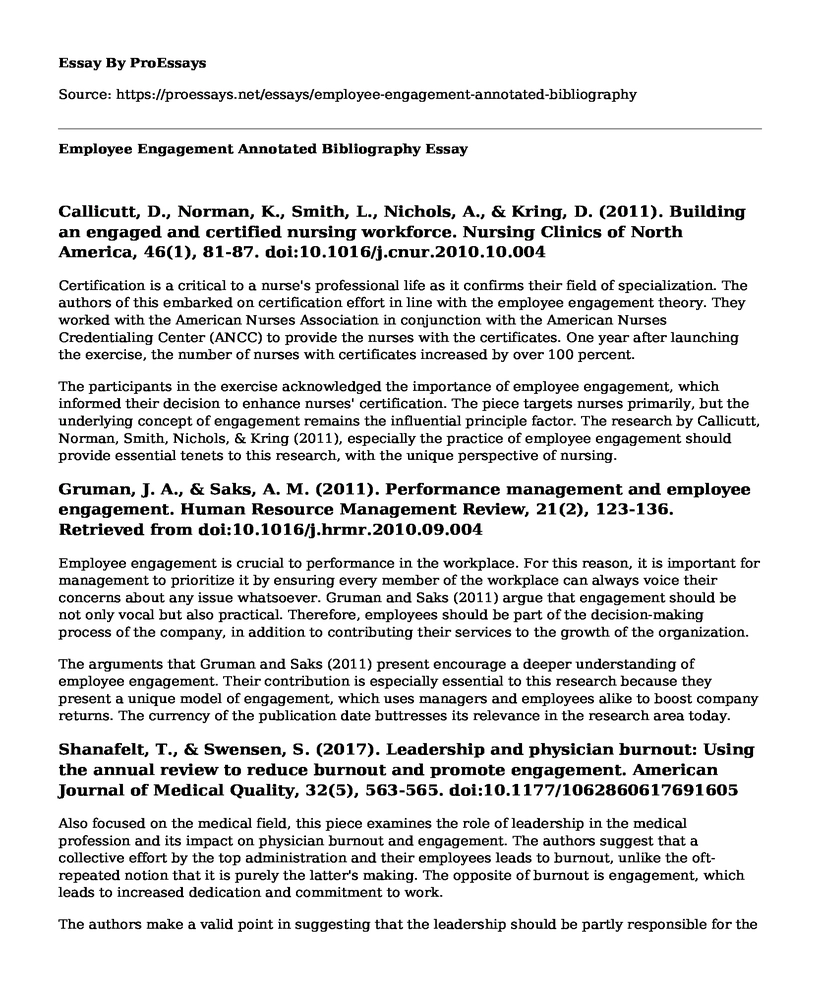Callicutt, D., Norman, K., Smith, L., Nichols, A., & Kring, D. (2011). Building an engaged and certified nursing workforce. Nursing Clinics of North America, 46(1), 81-87. doi:10.1016/j.cnur.2010.10.004
Certification is a critical to a nurse's professional life as it confirms their field of specialization. The authors of this embarked on certification effort in line with the employee engagement theory. They worked with the American Nurses Association in conjunction with the American Nurses Credentialing Center (ANCC) to provide the nurses with the certificates. One year after launching the exercise, the number of nurses with certificates increased by over 100 percent.
The participants in the exercise acknowledged the importance of employee engagement, which informed their decision to enhance nurses' certification. The piece targets nurses primarily, but the underlying concept of engagement remains the influential principle factor. The research by Callicutt, Norman, Smith, Nichols, & Kring (2011), especially the practice of employee engagement should provide essential tenets to this research, with the unique perspective of nursing.
Gruman, J. A., & Saks, A. M. (2011). Performance management and employee engagement. Human Resource Management Review, 21(2), 123-136. Retrieved from doi:10.1016/j.hrmr.2010.09.004
Employee engagement is crucial to performance in the workplace. For this reason, it is important for management to prioritize it by ensuring every member of the workplace can always voice their concerns about any issue whatsoever. Gruman and Saks (2011) argue that engagement should be not only vocal but also practical. Therefore, employees should be part of the decision-making process of the company, in addition to contributing their services to the growth of the organization.
The arguments that Gruman and Saks (2011) present encourage a deeper understanding of employee engagement. Their contribution is especially essential to this research because they present a unique model of engagement, which uses managers and employees alike to boost company returns. The currency of the publication date buttresses its relevance in the research area today.
Shanafelt, T., & Swensen, S. (2017). Leadership and physician burnout: Using the annual review to reduce burnout and promote engagement. American Journal of Medical Quality, 32(5), 563-565. doi:10.1177/1062860617691605
Also focused on the medical field, this piece examines the role of leadership in the medical profession and its impact on physician burnout and engagement. The authors suggest that a collective effort by the top administration and their employees leads to burnout, unlike the oft-repeated notion that it is purely the latter's making. The opposite of burnout is engagement, which leads to increased dedication and commitment to work.
The authors make a valid point in suggesting that the leadership should be partly responsible for the burnout that physicians experience. In the same regard, thorough engagement from the top-down leads to positive outcomes. The article is critical in decreasing such notions of individual failings whenever a physician undergoes burnout or fatigue. The authors suggest a way for leaders to invest in employee engagement more, interventions which are inexpensive. This piece is, therefore, vital in demonstrating the role different stakeholders should play in employee engagement for the benefit of all involved.
Cite this page
Employee Engagement Annotated Bibliography. (2022, Jun 22). Retrieved from https://proessays.net/essays/employee-engagement-annotated-bibliography
If you are the original author of this essay and no longer wish to have it published on the ProEssays website, please click below to request its removal:
- Career Plan: Personal Fitness Trainer
- Consulting Industry Paper Example
- King`s Conceptual System Theory Essay Example
- Paper Example on Unlock Future Success: Why Education Is Essential in the Job Market
- U.S. Jobs Record Streak: African Americans Fare Worse - Essay Sample
- Immigrant Workers: A Vital Part of the US Workforce Paper Example
- Research Paper Sample on Conflict Management







